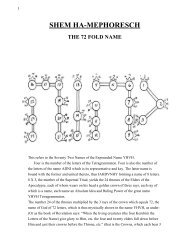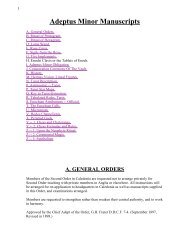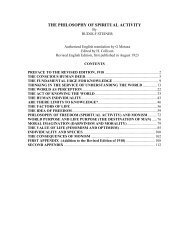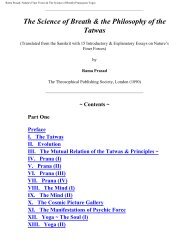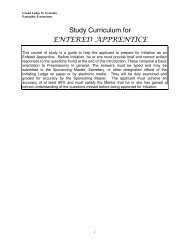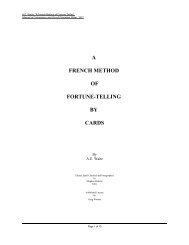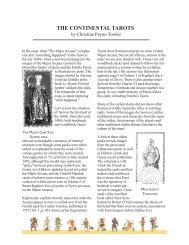Band 2 Anthropogenesis - H.P. Blavatsky
Band 2 Anthropogenesis - H.P. Blavatsky
Band 2 Anthropogenesis - H.P. Blavatsky
You also want an ePaper? Increase the reach of your titles
YUMPU automatically turns print PDFs into web optimized ePapers that Google loves.
"Supreme Deity" bears, in every ancient Pantheon -- including that of the Jews -- a dual character, composed of light and<br />
shadow.<br />
* The animal world, having simple instinct to guide it, has its seasons of procreation, and the sexes become neutralized<br />
during the rest of the year. Therefore, the free animal knows sickness but once in its life -- before it dies.<br />
** Introduction to "Prometheus Bound," p. 152.<br />
------------------------------------------------------------------------<br />
[[Vol. 2, Page]] 413 THE TRAVESTY OF PROMETHEUS.<br />
instead of "an untainted mind, heaven's first gift" (AEschylus), there was created the eternal vulture of the ever unsatisfied<br />
desire, of regret and despair coupled with "the dreamlike feebleness that fetters the blind race of mortals" (p. 556), unto<br />
the day when Prometheus is released by his heaven-appointed deliverer, Herakles.<br />
Now Christians -- Roman Catholics especially -- have tried to prophetically connect this drama with the coming of Christ.<br />
No greater mistake could be made. The true theosophist, the pursuer of divine wisdom and worshipper of ABSOLUTE<br />
perfection -- the unknown deity which is neither Zeus nor Jehovah -- will demur to such an idea. Pointing to antiquity he<br />
will prove that there never was an original sin, but only an abuse of physical intelligence -- the psychic being guided by<br />
the animal, and both putting out the light of the spiritual. He will say, "All ye who can read between the lines, study ancient<br />
wisdom in the old dramas -- the Indian and the Greek; read carefully the one just mentioned, one enacted on the theatres<br />
of Athens 2,400 years ago, namely 'Prometheus Bound' " The myth belongs to neither Hesiod nor AEschylus; but, as<br />
Bunsen says, it "is older than the Hellenes themselves," for it belongs, in truth, to the dawn of human consciousness. The<br />
Crucified Titan is the personified symbol of the collective Logos, the "Host," and of the "Lords of Wisdom" or the<br />
HEAVENLY MAN, who incarnated in Humanity. Moreover, as his name Pro-me-theus, meaning "he who sees before him"<br />
or futurity, shows* -- in the arts he devised and taught to humanity, psychological insight was not the least. For as he<br />
complains to the daughters of Oceanos:--<br />
"Of prophecies the various modes I fixed,<br />
And among dreams did first discriminate<br />
The truthful vision . . . and mortals guided<br />
To a mysterious art. . . . . . . . . . . . . . .<br />
All arts to mortals from Prometheus came. . ."<br />
[[Footnote(s)]] -------------------------------------------------<br />
* From [[pro metis]] pro metis, "forethought." "Professor Kuhn," we are told in the above-named volumes of "The Dramas<br />
of AEschylus," "considers the name of the Titan to be derived from the Sanskrit word Pramantha, the instrument used for<br />
kindling fire. The root mand or manth, implies rotatory motion, and the word manthami (used to denote the process of fire<br />
kindling) acquired the secondary sense of snatching away; hence we find another word of the same stock, pramatha,<br />
signifying theft." This is very ingenious, but perhaps not altogether correct; besides, there is a very prosaic element in it.<br />
No doubt in physical nature, the higher forms may develop from the lower ones, but it is hardly so in the world of thought.<br />
And as we are told that the word manthami passed into the Greek language and became the word manthano, to learn;<br />
that is to say, to appropriate knowledge; whence prometheia, fore-knowledge, fore-thought; we may find, in searching, a<br />
more poetical origin for the "fire-bringer" than that displayed in its Sanskrit origin. The Svastica, the sacred sign and the<br />
instrument for kindling sacred fire, may explain it better. "Prometheus, the fire-bringer, is the Pramantha personified,"<br />
goes on the author; "he finds his prototype in the Aryan [[Footnote continued on next page]]<br />
------------------------------------------------------------------------<br />
[[Vol. 2, Page]] 414 THE SECRET DOCTRINE.<br />
Leaving for a few pages the main subject, let us pause and see what may be the hidden meaning of this, the most<br />
ancient as it is the most suggestive of traditional allegories. As it relates directly to the early races, this will be no real<br />
digression.<br />
The subject of AEschylus' drama (the trilogy is lost) is known to all cultured readers. The demi-god robs the gods (the<br />
Elohim) of their secret -- the mystery of the creative fire. For this sacrilegious attempt he is struck down by KRONOS* and<br />
delivered unto Zeus, the FATHER and creator of a mankind which he would wish to have blind intellectually, and animallike;<br />
a personal deity, which will not see MAN "like one of us." Hence Prometheus, "the fire and light-giver," is chained on<br />
Mount Caucasus and condemned to suffer torture. But the triform Fates (Karma), whose decrees, as the Titan says, even<br />
Zeus:--<br />
"E'en he the fore-ordained cannot escape. . . "<br />
-- ordain that those sufferings will last only to that day when a son of Zeus --<br />
"Ay, a son bearing stronger than his sire" (787)<br />
. . . . . . . . . .<br />
"One of thine (Io's) own descendants it must be. ."(791)<br />
-- is born. This "Son" will deliver Prometheus (the suffering Humanity) from his own fatal gift. His name is, "He who has to<br />
come. . . . "<br />
On the authority, then, of these few lines, which, like any other allegorical sentence, may be twisted into almost any<br />
meaning; namely, on the words pronounced by Prometheus and addressed to Io, the daughter of Inachos, persecuted by<br />
Zeus -- a whole prophecy is constructed by some Catholic writers. Says the crucified Titan:--<br />
"And, portent past belief, the speaking oaks




